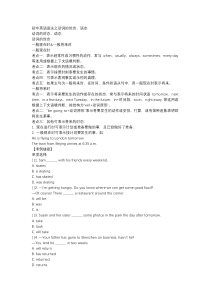 DOC
DOC
【文档说明】初中英语语法之动词的时态、语态.docx,共(11)页,19.484 KB,由小魏子文库上传
转载请保留链接:https://www.ichengzhen.cn/view-200956.html
以下为本文档部分文字说明:
初中英语语法之动词的时态、语态动词的时态、语态动词的时态一般现在时&一般将来时一般现在时考点一:表示经常性或习惯性的动作,常与often,usually,always,sometimes,everyday等连用或根据上下文语境判断。考点二:表示现在的情
况或状态。考点三:表示按照时刻表要发生的事情。考点四:可表示客观事实或永恒的真理。考点五:如果主句为一般将来时,在时间、条件状语从句中,用一般现在时表示将来。一般将来时考点一:表示将来要发生的动作或存
在的状态,常与表示将来的时间状语tomorrow,nexttime,inafewdays,nextTuesday,inthefuture,in+时间段,soon,rightaway等连用或根据上下文语境判断,其结构为“will+动词原形”。考点二:
“begoingto+动词原形”表示将要发生的动作或安排、打算,或有某种迹象表明即将发生某事。考点三:其他可表示将来的时态:1.现在进行时可表示计划或准备要做的事,且已经做好了准备;2.一般现在时可表示按计划要发生的事。如:HeisflyingtoLondontomorrow.Thetrainfr
omBeijingarrivesat6:35a.m.【考例链接】单项选择()1.Sam_______withhisfriendseveryweekend.A.skatesB.isskatingC.hasskatedD.wasskating()2.
—I’mgettinghungry.Doyouknowwherewecangetsomegoodfood?—Ofcourse!There_______arestaurantaroundthecorner.A.willbe
B.wasC.is()3.Susanandhersister_______somephotosintheparkthedayaftertomorrow.A.takeB.tookC.willtake()4.—Yourfa
therhasgonetoShenzhenonbusiness,hasn’the?—Yes.Andhe_______intwoweeks.A.willreturnB.hasreturnedC.returnedD.returns()5.Nextweek,eachstudentinthe
class_______asmallgiftfromtheirteachers.A.receivesB.receivedC.willreceiveD.hasreceived()6.—Accordingt
othetimetable,thetrain_______at8:27.—Don’tworry.Wecanmakeit.A.leavesB.isleavingC.isgoingtoleave()7.—Whatisyourplanfo
rnextweekend,Lingling?—I_______volunteerworkinthemuseum.A.wasdoingB.didC.havedoneD.amgoingtodo现在进行时&过去进行时现在进行时考点一:表示现在正在进行的动作和发生的事,常与
now,atthemoment,Look!,Listen!,Bequiet!,Hurryup!等连用或根据上下文语境判断。考点二:表示现阶段或一段时间内正在发生的事,常与thesedays,allthemorning等连用。过去进行时考点一:表
示过去某一时刻或某一段时间正在进行的动作。常与atthattime,atthistimeyesterday,then,allmorningyesterday等时间状语或由when,while引导的时间状语从句连
用或根据上下文语境判断。考点二:由when引导的时间状语从句,若主句的动作正在进行,这时从句的动作发生了,则主句用过去进行时,从句用一般过去时。考点三:由while引导的时间状语从句,当从句的动作正在进行,这时主句的动作发生了,则从句用过去进行时,主句用一般过
去时。若主从句的动作在过去同时进行,则主从句均用过去进行时。【考例链接】单项选择()1.Amon_______hisshipinabigstormwhenagiantfishcameoutofthesea.A.willsailB.issailingC.wassailingD.hassail
ed()2.Whilethelights_______tored,acarsuddenlyappearedaroundthecorner.A.changeB.havechangedC.werechangingD.willchange()3.—Wereyouathom
eat9o’clocklastnight?—Yes,I_______ashoweratthattime.A.tookB.wastakingC.wastakenD.amtaking()4.Studentsi
nGradeNine_______amathsexamatthistimeyesterday.A.takeB.aretakingC.weretakingD.havetaken()5.Sorry,Ididn’tseeyou,becauseI_______a
picture.A.drawB.drewC.wasdrawingD.havedrawn()6.Listen!Thebirds_______inthetreesoutsideourhotel.A.singB.aresingingC.sangD.weresinging()7.—Linda,Dadha
sfinishedhisworkandwe_______tothegymtopickyouup.—Thankyou,Mum.A.driveB.droveC.havedrivenD.aredriving()8.—Tom,what’syourdaddoing?—He____
___mybike.A.repairsB.willrepairC.hasrepairedD.isrepairing一般过去时&现在完成时一般过去时考点一:表示过去发生的动作或存在的状态,常与thedaybeforeyesterday,yesterda
y,anhourago,lastweek,justnow,in2016等连用或根据上下文语境判断。考点二:表示过去的习惯或经常发生的动作,句中常有always,often,usually等频度副词。如:
Shewasoftennervouswhenfacingthecameraasachild.现在完成时(have/hasdone)考点一:表示过去发生或已经完成的动作对现在造成的影响或结果,常与alread
y,just,yet,ever,never,before,sofar,recently,inthepast/last...years/months等连用或根据上下文语境判断。考点二:表示过去某一时间开始并
一直持续到现在的动作或状态,也许还要持续下去,该用法常适用于延续性动词,常与for+时间段或since+时间点或since引导的时间状语从句连用。考点三:一些短暂性动词转换成意义相近的延续性动词或be+形容词/副词/介词短语/a(n)+名词,与表示一
段时间的状语连用。如:buy→haveborrow→keepmove→livedie→bedeadopen→beopenclose→beclosedfallasleep→beasleepleave→beawaycome→bein/atbegin/start(电影等开始)→beonjo
in→bein+组织/beamemberin+组织marry→bemarried考点四:have/hasbeento表示“到过某地(现在已经回来了)”,句中常有表示次数的词语once,twice,threetimes等;have/hasg
oneto表示“去某地了(但还没有回来)”。【考例链接】单项选择()1.Meltingice(融冰)cancausesealevelstorise.Since1993,sealevels_______ataspeedof3.2c
mevery10years.A.roseB.haverisenC.rise()2.—Wendy,howlonghaveyouhadtheHuaweiP30Pro?—Acoupleofdays.I_______itlast
week.A.boughtB.buyC.willbuyD.havebought()3.Hehasn’tcommunicatedmuchwithhisparentssincehe_______amobilephonelastyear.A.gotB.ge
tC.gets()4.He_______hisEnglishteacherwhenhewassightseeinginParis.A.hasmetB.hadmetC.metD.wouldmeet()5.Iatesomefruit,whichI_______sin
ceIwasachild,andthevegetablesfrommygarden.A.haveenjoyedB.enjoyedC.enjoyD.hadenjoyed()6.—Thisisareallyoldbike.—Yes,I_______itforsevenyears.A.ha
vehadB.haveboughtC.bought()7.TheshopinWandaSquare_______forsixyears,butI_______theresofar.A.hasopened;haven’tgoneB.has
beenopen;haven’tbeenC.hasbeenopen;haven’tgoneD.hasbeenopened;haven’tbeen()8.—WhereisMr.Green?—He_______thebookshop.Youhavetowaitforhim.A.wasgoingtoB.
hasgonetoC.hasbeento动词的语态动词的语态分为主动语态和被动语态。考点一:被动语态由“be+及物动词的过去分词”构成(注意:以下用done表示及物动词的过去分词),be有人称、数和时态的变化。温馨提示:《义务教育英语课程
标准》要求掌握的被动语态有一般现在时的被动语态(am/is/are+done),一般过去时的被动语态(was/were+done)和一般将来时的被动语态(willbe+done)。现在完成时的被动语态及含有情态动词的被动语态对学有余力的同学来说也应了解,其构成
分别为“have/has+been+done”和“情态动词+be+done”。考点二:使役动词(如make,let等)及感官动词(如hear,feel,watch,see等),在主动语态句子中后面接不带to的动词不定式(短语)作宾语补足语,在被动语态句子中后面
要接带to的动词不定式(短语)作主语补足语。考点三:含有双宾语的主动语态句子变为被动语态句子时,如果直接宾语作句子的主语,那么间接宾语前需要加介词to或for。考点四:被动语态用在一些固定句型中,如:Itissaidthat...(据说……)Itisbeliev
edthat...(据信……)Itiswellknownthat...(大家知道……)Itissupposedthat...(据推测……)考点五:有些词用主动语态表示被动意义。如:Theclothwasheswell.这布很耐洗。Thepoemreadswell.这首诗读起来顺口。【考
例链接】Ⅰ.单项选择()1.Manyteachersfromcities_______tothewestprovincesofourcountrytohelpthepoorstudentstherenextyear.A.willsendB.a
resentC.willbesent()2.—I’mtiredofcleaningthehouse.—Sweepingrobots_______moreandmorewidelytoday.Whynotbuyone?A.areusedB.wereusedC.areusingD.used()3
.Asweknow,printing_______duringtheSuiandTangDynastiesinChina.A.inventedB.isinventedC.wasinvented()4.Lookattheflowersonbothsidesofthestreets.They_
______lastmonth.A.wereplantedB.areplantedC.areplantingD.wereplanting()5.—Tomisalwayscarelesswithhisschoo
lwork.Couldyouhelphim?—Noproblem!Ithinkhe_______tothinktwicebeforestarting.A.shouldbetoldB.shouldn’tbetoldC.shouldtell()6.
—Wouldyouliketogoshoppingwithmeafterlunch?—I’dloveto,butI_______togooutthisafternoon.A.don’tallowB.willallowC.won’tbeallowed()7.Thetick
etsforTheWanderingEarth_______well,andtheywill_______soon.A.aresold;selloutB.aresold;soldoutC.sell;besoldout()8.—Dr.Bethune
helpedalotofChineseinthe1930s;heisagreatinternationalsoldier.—Iknow,sohe_______still_______inbothChinaandCanadanow.A.has;rememberedB.is;
rememberedC.will;rememberD.is;remembering()9.Manyoldtreesandhouses_______bytheterriblerainstormlastnight.A.a
repulleddownB.werepulleddownC.willbepulleddownⅡ.将下列句子改为被动语态1.The13-year-oldone-armedbasketballplayerattractedalotoffans.A
lotoffans______________bythe13-year-oldone-armedbasketballplayer.(2020上海)2.Wewillsolvetheproblemintwoweeks.Theproblemwill______________byusintwowee
ks.综合训练Ⅰ.单项选择()1.—Lindahas_______toParis.HowcanIgetintouchwithher?—Don’tworry.Shewillcallyouassoonasshe____
___there.A.been;willgetB.been;getsC.gone;willgetD.gone;gets()2.NationalDaycelebrationsforChina’sseventiethbirthday_______inaboutthreemonths.A
.willbeheldB.willholdC.isheldD.washeld()3.—Alex,whydidn’tyouanswermycallatninelastnight?—Sorry,I_______mymobilephoneathome.I_______basketballin
theparkwithmyfriends.A.forgot;playedB.forgot;wasplayingC.left;playedD.left;wasplaying()4.—Jeff,couldyoutellmeifit_______tomorrow?Ifit_______tomorro
w,Iwillstayathome.—It’sreportedthatitwillbesunny,let’sgocampingontheFenghuangmountain.A.rain;rainB.rains;r
ainsC.willrain;rainsD.willrain;willrain()5.—MayIspeaktoMrs.Smith?—Sorry,she_______theclothes.A.iswashingB.washesC.wash()6.—Hurryup!—Onemom
ent.I_______mye-mailsandthenI’mreadytogo.A.readB.amreadingC.wasreadingD.haveread()7.—I’veneverseenMr.Taylorbefore.—Don’tworry.I_______himtoyoubefo
rethemeeting.A.willintroduceB.introducedC.haveintroducedD.hadintroduced()8.—Icalledyoulastnight,butnobodyanswered.Wherewereyouthen
?—Oh,I_______mypetdoginmyyard.A.walkedB.waswalkingC.amwalkingD.willwalk()9.Bequiet!Thestudents_______anEnglishexam.A.takeB.aret
akingC.willtake()10.MyEnglishteachertookaphotoofmewhileI_______atthesportsmeeting.A.runB.wasrunningC.ran()11.—Haveyoueve
r_______theTerracottaArmyinXi’an?—Yes,Iwenttherelastyear.A.gonetoB.beentoC.beenin()12.Tomsaidhe_______basketballwithhisclassmatesfrom4
:00to6:00yesterdayafternoon.A.isplayedB.wasplayingC.playsD.hadplayed()13.—Look!Mymother_______anewdressforme.
—Wow,itlooksveryniceonyou.A.ismakingB.hasmadeC.willmake()14.Whenwe_______buildingtheSubwayLine3,itwillbeeasiertotravelaroundtheci
ty.A.finishB.finishedC.willfinish()15.She’sbroughtyousomeeggs.Asyouknow,she_______chickens.A.keepsB.willkeepC.ha
skeptD.kept()16.Inthenearfuture,there_______self-drivingcarsinourcity.A.isB.wasC.areD.willbe()17.It_
______.Pleasetakeanumbrellawithyou,Annie.A.rainsB.israiningC.rainedD.wasraining()18.He_______mehisname,butIcan’trememberitnow.A.tellsB.willtellC
.toldD.istelling()19.—Mary,Irememberyou_______severalyearsago.—Yes,I_______for3years.A.married,havemarriedB.married,marri
edC.married,havebeenmarriedD.havemarried,havebeenmarried()20.—_______youever_______HongKong-Zhuhai-MacaoBrid
ge?—Notyet.A.Did;visitB.Are;visitC.Have;visited()21.I_______abroadforseveralyears,butIhaveneverregrette
dmyfinaldecisiontomovebacktomymotherland.A.amlivingB.livedC.havelived()22.—Myfeelingsforyouhavenotchanged.—Butyouhavechanged.Y
ouarenotasyou_______.A.areB.wereC.willbeD.havebeen()23.TheChinaInternationalSearchandRescueTeamhasbroughthelpandhopetopeopleindisastersaroundtheworld
sinceit_______18yearsago.A.setupB.issetupC.wassetupD.willbesetup()24.InChineseculture,childrenbornintheY
earoftheMonkey_______tobesmart.A.sayB.saidC.willbesaidD.aresaid()25.—Wherewillthe2022WinterOlympics_______,Cindy?—InBeijing,thecapital
ofChina,thefirstcitytohostbothSummerandWinterOlympics.A.betakenplaceB.takeplaceC.takepartD.betakenpartⅡ.根据括号内的提示填空1.AsIwastryingtofindm
ywayout,Isuddenly_______somenoise.(hear)2.Inordertoliveinabetterplace,thenaturalenvironmentmustbe_______byallthepeople.(protect)3.Thisnovelisveryinte
resting.Mybrother_______(read)itthreetimes.4.Thestorybookcan_______(nottake)outofthereadingroom.5.Someoftheworld’sgreatestbooks_______(write)
longago.6.IwaswatchingTVwhilemyparents_______(chat)ontheWeChat.7.Rubbish_______(separate)intogroupsinmanyotherciti
esnow,followingthepracticeinShanghai.8.Anewbigpark_______(build)inourcitynextyear.9.Theelectriclightwas_______(发明)
byEdison(爱迪生).10.Inancienttimes,foodwas_______(存储)upforwinter.11.Ourschoolisgoingto_______(修建)anewlibraryne
xtmonth.Ⅲ.选词语填空dream,shine,giveout,win,hold1.Theboy_______highpraiseforhiseffortstohelphisclassmateslastterm.2.Happiness___
____inthedoctor’seyeseverytimesheseesapatientgetwell.3.Aclassicalconcert_______onlinenextmonth.4.Someclimbers____
___ofgettingtothetopofMountQomolangmaforalongtime.5.Lucy_______thenewbookswhenIenteredtheclassroom.图片参考答案动词的时态一
般现在时&一般将来时1-5ACCAC6-7AD现在进行时&过去进行时1-5CCBCC6-8BDD一般过去时&现在完成时1-5BAACA6-8ABB动词的语态Ⅰ.1-5CACAA6-9CCBBⅡ.1.wereatt
racted2.besolved综合训练Ⅰ.1-5DADCA6-10BABBB11-15BBBAA16-20DBCCC21-25BBCDBⅡ.1.heard2.protected3.hasread4.notbetak
en5.werewritten6.werechatting7.isseparated8.willbebuilt9.invented10.stored11.buildⅢ.1.won2.shines3.willbeheld4.havedreamed5.wasg
ivingout
 辽公网安备 21102102000191号
辽公网安备 21102102000191号
 营业执照
营业执照